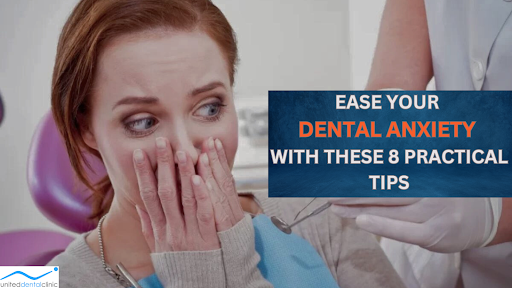Regular dental visits are critical for keeping up your good oral health. Still, many people avoid visiting a dentist because of dental anxiety.
Dental anxiety is the fear or stress related to the dental setting. Things like drills, needles, or dental settings in general can fan the flames of dental anxiety. This can result in delaying or completely avoiding dental visits.
Moreover, when dental anxiety is severe and results in irrational dental fear, it can be termed dental phobia.
Does this sound like you? We are here to help.
You can fight off your anxiety in various ways, of which sedation dentistry is the best. Yet, we will discuss every tip in detail to help you. So, keep reading!
What are the symptoms of dental anxiety?
Do you know whether you have dental anxiety?
Some people suffer from a certain level of uneasiness, yet it does not stop them from visiting the dentist. On the contrary, people with serious dental anxiety can suffer from tormenting symptoms as the following:
- Panic attacks
- Heart palpitations
- Aggressive behaviour
- Low blood pressure
- Crying
- Extreme sweating
- Feeling faint
Such symptoms can prevent the patient from getting the dental care s/he deserves.
For example, the dentist might find cavities and other concerns during a dental checkup. If people do not visit the dentist, such issues will get bigger, leading to tooth loss, bad breath, and other problems.
So, consider the following tips to ease your anxiety and maintain oral health.
How to overcome dental anxiety?
- Discuss with your dentist
Willingness to discuss your fears with your dentist is a primary and prominent step towards conquering your dental anxiety.
If you open up, your dentist can give you practical advice and create a comfortable experience. For this, they will:
· Reply to your queries honestly to help you prepare mentally
· Offer suggestions on coping tips like getting sedation
· Assure you that your concerns will be addressed
· Ask for your consent before starting any treatment
· Explain the procedure to make sure that you both are on the same page and mentally prepared
- Take a trustworthy person with you
Peer encouragement can ease dental phobia in patients. It can be a friend, family member, or workout buddy. So, patients should find someone they can rely on and take them along for a dental visit to help ward off dental anxiety.
Taking someone along can also help when you get sedation.
- Agree on a signal
Sometimes, patients feel stressed or anxious because they cannot talk or move once the treatment starts. Hence, agreeing on a signal, like raising your right or left hand, can indicate that you need a break.
So, you can just raise your hand, and the orthodontic dentist will stop midway.
- Meditation and muscle relaxation
While you are in the waiting room or as you sit in the dental chair, anxiety can worsen. Here, a simple practice like meditation can help promote calmness and minimise stress.
It includes a condition of increased awareness, muscle relaxation, and focus that you can attain anywhere, including the dental office.
How to do it? As you sit, close your eyes, and allow your body to relax fully. Concentrate on different body parts and consciously release tension. Start from your head down to your toe. You can practise meditation before or during your treatment to ease your anxiety.
- Opt for sedation dentistry
Mindfulness and discussion with your dentist can ask for a little effort from your side. Fortunately, there is an easy alternative to relieve your dental stress – sedation dentistry.
In sedation dentistry, a dentist uses medications to ease discomfort. It is also helpful in mitigating pain and makes treatment easy. Also, it is beneficial for dentists as they can perform their tasks easily.
Sedation dentistry is the ultimate option for people needing oral surgery and children undergoing complex dental procedures.
Various types of sedation dentistry techniques are available, and their application depends on the complexity of the treatment. For example:
· Nitrous oxide is applied through a mask and is especially beneficial for kids
· Oral medicines should be taken an hour before. It makes a person drowsy, and s/he falls asleep
· Intravenous injections in sedation dentistry make the patient unconscious. It is useful for complex and invasive dental surgeries.
- Consider anxiety-relieving medication
You can ask your orthodontic dentist to prescribe you an anxiety-relieving medication. Such medicines can help you control symptoms like increased heart rate, heavy sweating, and restlessness during your treatment.
As a result, you can feel more in control of your situation.
- Join an online community
You might feel awkward with dental phobia, but it is more common than you know. Numerous people suffer from dental phobia, and knowing you are not alone can boost your morale.
Such groups with people suffering from dental anxiety can be enlightening. It can provide useful tips to deal with your stress, and group people can understand what you are going through.
Additionally, you can share your experience and coping strategies like sedation dentistry after successfully completing your treatment.
- Do not pressurise yourself
You have earned a pat on the back for taking the initiative to limit your dental anxiety. The situation can be difficult to deal with, and discussing it can be even harder.
However, managing and lowering your expectations can be of assistance, as it might take some time before you notice a change.
So, do not pressurise yourself if you are making efforts and going in the right direction – towards a stress-free dental appointment. Also, sedation dentistry has got your back.
Takeaway
Dental anxiety can affect anyone, regardless of gender or age. However, you can rescue your oral health from the clutches of dental phobia through the above-mentioned techniques.
Among them, the best and easy technique will always be sedation dentistry.











